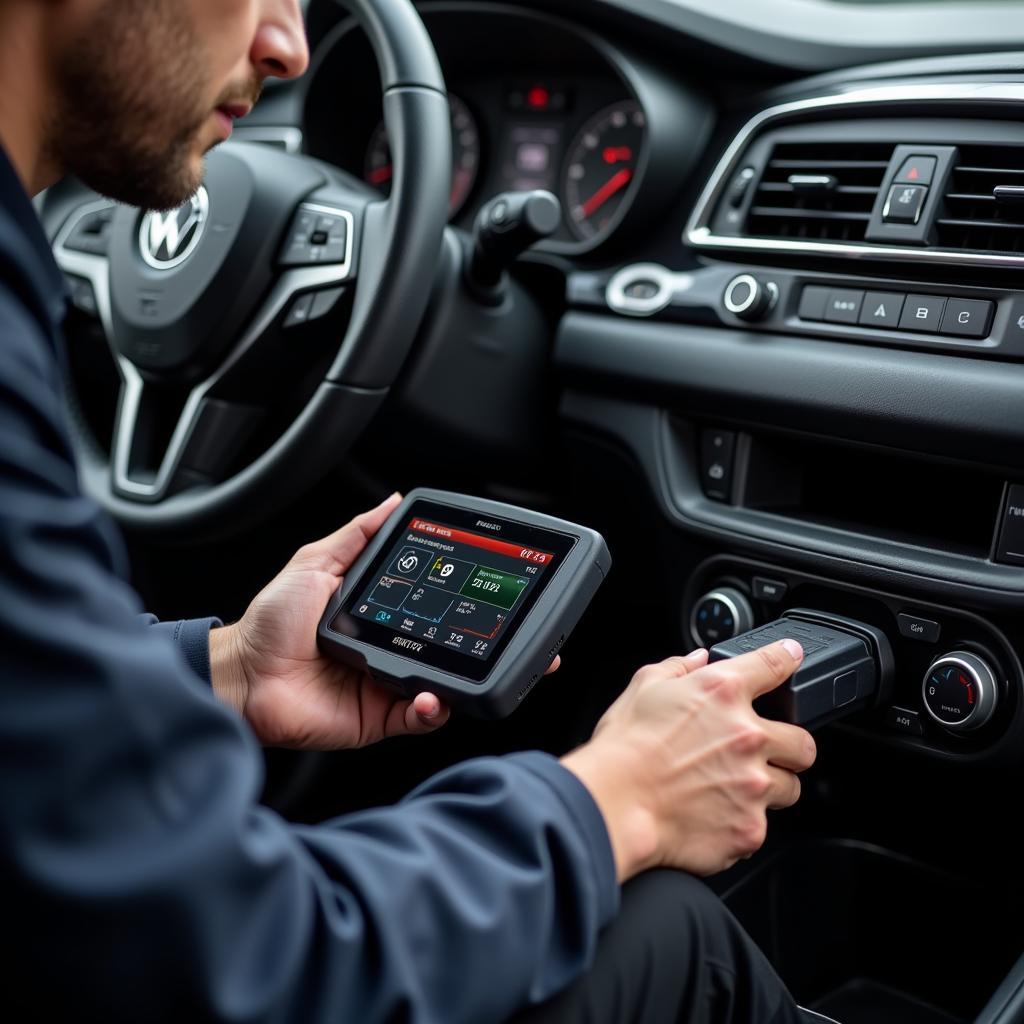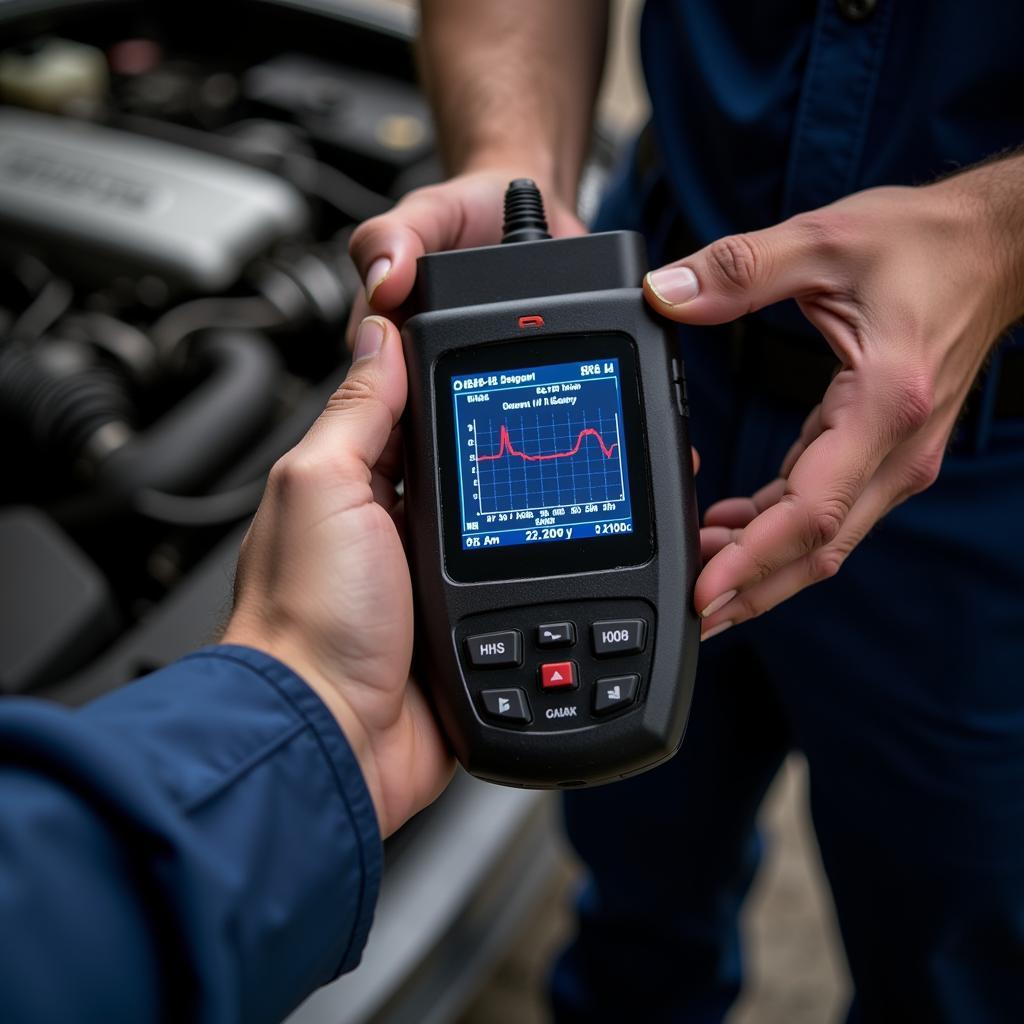Finding the Best Car Diagnostic Device can feel overwhelming with so many options on the market. Whether you’re a seasoned mechanic or a car enthusiast looking to troubleshoot your vehicle, having the right diagnostic tool can save you time, money, and unnecessary headaches. This comprehensive guide will explore everything you need to know to make an informed decision and find the perfect car diagnostic device for your needs.
What is a Car Diagnostic Device and Why Do You Need One?
A car diagnostic device, also known as a car diagnostic scanner or code reader, is an essential tool that connects to your car’s onboard computer (ECU) to retrieve diagnostic trouble codes (DTCs) and other valuable data. These codes act like your car’s internal communication system, alerting you to potential issues within the engine, transmission, airbags, brakes, and other critical systems.
 Mechanic using a best car diagnostic device
Mechanic using a best car diagnostic device
Having a car diagnostic device empowers you to:
- Diagnose car problems: Identify the root cause of those pesky check engine lights and other warning signals.
- Save money on repairs: Avoid costly guesswork by mechanics and understand the issue before taking your car to the shop.
- Monitor car performance: Track vital engine parameters like RPM, temperature, fuel efficiency, and more.
- Customize your driving experience: Some advanced scanners allow for modifications and customizations to enhance your car’s performance.
Types of Car Diagnostic Devices
Understanding the different types of car diagnostic devices available can help you choose the one that aligns with your budget and skill level:
1. Basic Code Readers:
These entry-level devices are ideal for beginners and everyday car owners. They offer a simple and affordable way to read and clear basic engine-related DTCs. However, they may not provide detailed information or access to all vehicle systems.
2. OBD-II Scanners:
A step up from basic code readers, OBD-II scanners offer more advanced functionalities, including reading live data streams, accessing manufacturer-specific codes, and performing some bi-directional controls. They strike a good balance between affordability and comprehensive diagnostics.
 Mechanic reviewing diagnostic data on a best car diagnostic scanner
Mechanic reviewing diagnostic data on a best car diagnostic scanner
3. Professional-Grade Scan Tools:
These high-end devices are typically used by professional mechanics and offer the most comprehensive diagnostic capabilities. They can access all vehicle systems, perform complex bi-directional tests, program keys, and even provide repair guidance.
Key Features to Consider When Choosing a Car Diagnostic Device
1. Vehicle Compatibility:
Ensure the device you choose is compatible with your vehicle’s make, model, and year. Consider a device with wide vehicle coverage if you work on multiple cars.
2. Code Reading and Clearing:
The primary function of any diagnostic device is to read and clear DTCs. Look for a device that can read and interpret both generic and manufacturer-specific codes.
3. Live Data Streaming:
Access to real-time data streams from various sensors allows you to monitor engine performance, identify potential issues before they escalate, and make informed decisions about maintenance.
4. Bi-Directional Control:
This feature allows you to interact with specific vehicle components, such as turning on the fuel pump or activating solenoids, for more advanced troubleshooting and testing.
5. User Interface and Software:
Choose a device with an intuitive user interface, easy-to-navigate menus, and clear data presentation. Consider devices with software updates to ensure compatibility with the latest vehicle models.
6. Additional Features:
Some devices offer additional features like ABS bleeding, battery testing, DPF regeneration, and more. These features can be beneficial depending on your specific needs and skill level.
Best Car Diagnostic Device for DIYers
For car enthusiasts and DIYers, the best car diagnostic device offers a user-friendly interface, essential diagnostic capabilities, and affordability. Look for devices that provide clear explanations of DTCs and offer some live data streaming functionalities.
Check out our review of the best car software diagnostic for options tailored to DIY users.
Best Car Diagnostic Device for Professionals
Professional mechanics require advanced diagnostic tools with comprehensive vehicle coverage, bi-directional control capabilities, and access to manufacturer-specific information. Investing in a high-quality professional-grade scan tool can significantly improve diagnostic accuracy and efficiency.
Explore our recommendations for the best car diagnostics reviews uk to find the ideal scanner for professional use.
Tips for Using a Car Diagnostic Device
- Always consult your vehicle’s repair manual: While diagnostic devices are helpful, it’s crucial to refer to your car’s specific repair manual for accurate troubleshooting information.
- Clear codes after repairs: After addressing the underlying issue, remember to clear the DTCs to prevent false readings in the future.
- Keep your device’s software updated: Regular software updates ensure compatibility with the latest vehicle models and access to the latest features.
Conclusion
Choosing the best car diagnostic device is an investment that can save you time, money, and frustration in the long run. Whether you’re a car enthusiast wanting to understand your vehicle better or a professional mechanic seeking advanced diagnostic capabilities, understanding your needs and the available options is crucial. By carefully considering the factors discussed in this guide, you can confidently choose the perfect car diagnostic device to keep your vehicle running smoothly.
Need help finding the right car diagnostic scanner software? We’ve got you covered! Visit our comprehensive review of the best car diagnostic scanner software to discover the top options available.
FAQs
1. Can I use a car diagnostic device on any car?
Car diagnostic devices have varying compatibility. While most modern vehicles use the standard OBD-II port, the level of access and functionality may differ. Always check the device’s compatibility before purchasing.
2. What is the difference between generic and manufacturer-specific codes?
Generic codes apply to a wide range of vehicles and indicate common issues, while manufacturer-specific codes provide more detailed information related to a particular make and model.
3. Do I need a professional-grade scanner for basic car maintenance?
A basic code reader or OBD-II scanner is usually sufficient for basic maintenance tasks like reading and clearing check engine lights.
4. Can I use a car diagnostic device to reset my car’s computer?
While some devices offer a battery reset function, it’s not recommended to reset your car’s computer without proper knowledge, as it can potentially erase important settings and adaptations.
5. How often should I use a car diagnostic device?
It’s a good practice to scan your car periodically, even if there are no apparent issues, to detect potential problems early on. You can also use it to monitor engine parameters and track your car’s performance.
Still have questions or need personalized recommendations? Our team of car diagnostic experts is here to help! Contact us via WhatsApp at +1(641)206-8880 or email us at [email protected]. We offer 24/7 support to address all your car diagnostic needs.
Explore More:
- Find the best car diagnostic app for android to diagnose your car on the go.
- Discover the best car diagnostic tool for vw for specialized diagnostics for Volkswagen vehicles.

Leave a Reply